Organic personality disorder is persistent disorder brain. The cause of the violation can be infectious diseases, dysfunctions or mechanical injuries of the frontal lobe. This leads to a change in human behavior, emotional exhaustion and a drop in thinking function.
Record content:
-
1 Views
- 1.1 Emotionally labile disorder of organic nature
- 1.2 Asthenic organic disorder
- 1.3 Organic anxiety disorder
- 1.4 Delusional psychopathy
- 1.5 Schizophrenic disorder
- 2 Stages and degrees
- 3 Symptoms
- 4 Reasons for the appearance
- 5 Diagnostics
- 6 When to see a doctor
- 7 Prophylaxis
-
8 Treatment methods
- 8.1 Medications
- 8.2 Traditional methods
- 8.3 Other methods
- 9 Possible complications
- 10 Organic personality disorder videos
Views
The disease can be either congenital or acquired. A disorder that manifests itself from childhood is reflected in the entire later life of a person, and is rarely treatable. The child grows up asocial, withdrawn, shows aggression.
The following forms of the disease are distinguished:
- asthenic;
- euphoric;
- aggressive;
- apathetic;
- paranoid;
- explosive.
Pathology is chronic, exacerbation occurs at critical periods of life, such as:
- puberty;
- menopause, childbirth;
- severe stress;
- infectious diseases.
In a favorable environment, a period of remission is observed. A person develops a stable personality compensation, and his ability to work is normalized. In the absence of treatment, the disease continues to progress, leading to a complete inability of the patient to adapt to the conditions of society.

Organic disorder is divided into 5 types:
- Emotionally labile.
- Asthenic disorder.
- Anxiety disorder.
- Delusional psychopathy.
- Schizophrenia-like disorder.
Often the person does not acknowledge the disorder and avoids treatment. Timely therapy can improve his condition and slow down the progression of pathology.
Emotionally labile disorder of organic nature
The disease is characterized by persistent or recurrent bouts of nervousness. A person complains of incontinence in relation to other people, feels physical discomfort, often notes manifestations of pain syndrome and decreased performance.
The main causes of this disorder are severe hypertension or cerebral circulation disorder. In rare cases, a stroke leads to pathology.
Emotional labile disorder is characterized by:
- migraine attacks;
- photophobia;
- general weakness;
- decreased physical activity;
- there is a violation of concentration;
- the person often cries, becomes irritable.
Before starting treatment, the doctor assesses the severity of the organic disorder and establishes the cause of the development of the disease. Drug therapy includes nootropic drugs, multivitamin complexes and non-specific stimulants. To restore working capacity, a course of physiotherapy is prescribed.
Asthenic organic disorder
The disease is a violation of the psychoemotional state, accompanied by increased nervousness and cerebrasthenic symptoms.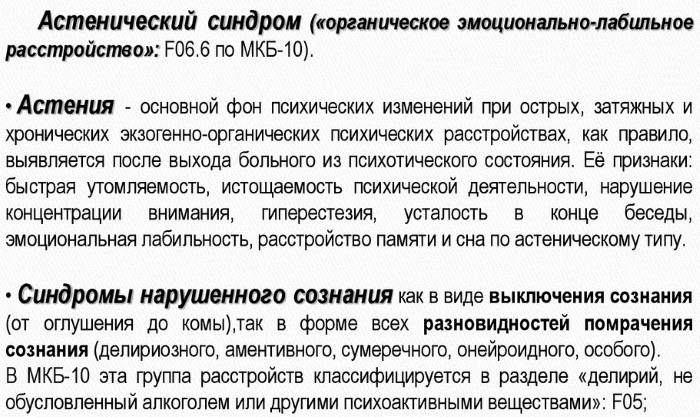
Damage to the vessels of the brain can provoke the development of pathology. In the early stages, the disease manifests itself as cerebral asthenia - even after a little physical or mental stress, severe fatigue occurs. If untreated, the disease progresses to vascular dementia.
The main risk factor is hereditary predisposition and constant stress.
Pathology has the following clinical picture:
- severe nervousness, a feeling of pain of any nature in different parts of the body;
- rapid decline in performance;
- tantrums;
- muscle weakness;
- migraine;
- sleep disorder.
Asthenic organic disorder is determined only if the person does not reveal deep disturbances of consciousness. In addition to psychological examination, diagnosis requires echocardiography, CT, and ultrasound.
Treatment is aimed at restoring normal cerebral circulation. The patient is prescribed tonics, adaptogens, nootropic drugs and antidepressants.
Organic anxiety disorder
The disease is accompanied by depression. Violation of the psycho-emotional state begins with anxiety, panic attacks. An acute disorder of cerebral circulation, myocardial infarction or ischemic disease can provoke the development of pathology.
Anxiety disorder is accompanied by the following symptoms:
- tremor of the limbs;
- spasms, cramps of the abdominal muscles, especially in the epigastric region;
- muscle tension around the scalp;
- tachycardia;
- dyspnea;
- pallor of the skin, alternating with redness;
- dry mouth.
The treatment regimen includes tranquilizers that have a sedative or hypnotic effect. The duration of drug therapy should not exceed 2 weeks. In a serious condition, antidepressants and antipsychotics are additionally prescribed.
Delusional psychopathy
Personality pathology is characterized by the presence in a person of constant false ideas and beliefs. The causes of the disease are unknown. In theory, the disease is hereditary, the symptoms are exacerbated against the background of severe stress, after injury, alcohol abuse.
The main symptom is recurrent or persistent delusions. A person's pursuit of a particular idea or thought distinguishes psychopathy from schizophrenic disorder. As a treatment, the patient is prescribed antipsychotics. If a person has depression, anxiolytics and antidepressants are added to the therapy regimen.
Schizophrenic disorder
Organic schizophrenia-like personality disorder is a rare disorder that occurs in 5% of cases and is associated with epilepsy and psychosis. Pathology develops as a result of brain damage with encephalitis in the parietal and temporal lobes.
A person comes up with delusional visions of a theological nature, suffers from depression and a disorder of consciousness. In special cases, paranoid psychosis is observed. The patient falls into experiences, ecstasy, complains of auditory hallucinations.
Stages and degrees
Organic personality disorder is a pathology that slowly progresses with a gradual deterioration in the general condition of a person.
The disease varies in severity:
- easy;
- moderate;
- heavy.
In the early stages of progression, pathology is manifested by general weakness and decreased performance. The disease of moderate severity is manifested by physical discomfort, recurrent or persistent headaches. Severe manifestations of delusion, antisocial behavior and prolonged depression with further progression of the pathology pose a threat to the patient's life.
The stages of development of an organic personality disorder differ depending on the form of pathology:
| Name | Development stages and manifestations |
| Asthenic | 1. In the initial stage, there is rapid physical and emotional exhaustion. 2. As the disease progresses, persistent hypertension occurs. 3. Muscle weakness manifests itself. 4. Frequent mood swings, irritability, photophobia, severe headaches are observed. |
| Explosive | 1. The person becomes irritable. 2. Emotional stability is lost. Decreases resistance to stress. A person can easily fall into hysterics, cry for a long time. 3. Social maladjustment occurs. |
| Aggressive | 1. The patient shows unreasonable aggression towards material objects and people around him. 2. He is dissatisfied with life, shows constant dissatisfaction. 3. May harm yourself or others. |
| Paranoid | 1. In the early stages of the development of the disease, suspicion and anxiety are manifested. 2. Constant worry develops into a false sense of impending danger. 3. A person ceases to be interested in events in the world, does not leave home, gives up hobbies and work. Lives in constant fear and anticipation of an attack. |
| Euphoric | 1. There is a constant feeling of joy, the person feels happy. 2. Behavior becomes inadequate, infantile. 3. As the pathology progresses, the person gets rid of self-criticism, does not want to take responsibility for his actions. |
| Apathetic | A person gradually loses interest in life, shows indifference to the events taking place. With the development of complications such as depression, suicidal thoughts may arise. |
In special cases, the disease can proceed in a mixed form, combining many clinical manifestations of an organic disorder. In the terminal stage, regardless of the type of pathology, in the absence of treatment, vascular dementia and a decrease in mental activity are observed.
Symptoms
Organic personality disorder is a disease with the following clinical picture:
- inability to concentrate on the work process;
- bright emotional instability, lack of self-control: apathy can be interrupted by bouts of euphoria or aggression;

- any changes in the usual way of life cause severe irritation;
- a person ignores social norms of behavior: steals unnecessary things, shows inappropriate sexual behavior, can attack another person;
- food abuse, lack of personal hygiene;
- in special cases, it is possible to develop paranoia, increased suspicion, fixation on any idea, often of a religious nature;
- a desire to assess someone else's behavior, a change in speech.
Usually, at the initial stage of the progression of pathology, a person begins to forget about small everyday things or spoken words, which speaks of developing dementia.
The clinical picture may vary depending on the causes of organic psychosis:
- Cerebrovascular accident. Rapid physical exhaustion is observed, a person reacts sharply to external stimuli, and may cry for no reason. Hypochondriac symptoms appear.
- Head trauma, severe infectious disease. In addition to a decrease in efficiency, meteorological dependence is observed. A person does not tolerate sudden changes in temperature.
- Epilepsy. Self-centeredness, unrestrained aggression, sad and spiteful mood are manifested. The person becomes vindictive, but tries to be as polite as possible. Pays excessive attention to small details.
Delusional psychopathy and schizophrenia-like disorder are different. In the first case, the disease is expressed in persecution mania, fixed ideas about the presence of severe pathology leading to near death. With a schizophrenic disorder, visual hallucinations dominate, a disorder of thinking is observed without memory impairment.
Reasons for the appearance
Organic personality disorder is a medical condition triggered by the following disorders:
- Traumatic brain injury. Mechanical damage to the frontal lobe of the brain can provoke the development of any type of organic disorder. Rupture of blood vessels, foci of ischemia or disruption of communication between neurons leads to memory impairment, decreased mental activity, and emotional instability.
- Brain tumors. Neoplasms of a malignant and benign nature, as they grow, squeeze the brain in the cranium. As a result, the development of delusional psychosis and schizophrenia-like disorder is possible.
- Infectious diseases: encephalitis, meningitis, HIV infection, neurosyphilis. They can provoke emotionally labile or asthenic pathology. Neurons stop performing their function, which leads to dementia and the development of fatigue. A person loses resistance to stress, from which, in unfavorable conditions, he ceases to control his emotional state.
- Disorder of cerebral circulation and other cardiovascular pathologies. Lead to the development of oxygen starvation of cells, ischemia. The transmission of nerve impulses between neurons is disrupted. As a result, emotionally labile pathology and anxiety disorder develop.
- Alcohol and drug abuse. Intoxication of neurons leads to dysfunction of the brain, changes in consciousness and behavior of the patient. As a result, the development of delusional psychosis is observed.
-
Epilepsy. It becomes the cause of the development of a schizophrenic personality disorder. The disease affects the temporal and parietal lobes, as a result of which memory deteriorates, the habitual pattern of behavior changes, and thinking disorder is observed.
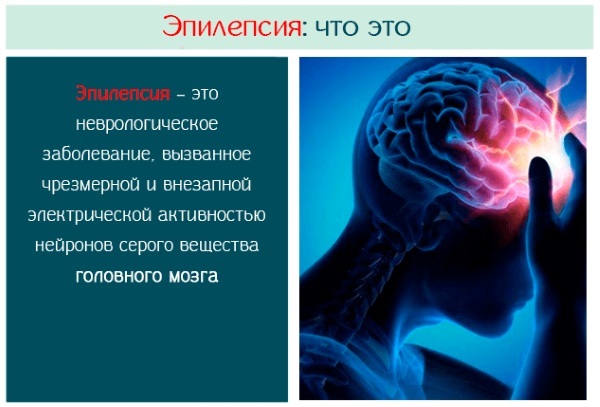
In rare cases, an organic disorder develops as a complication of diabetes mellitus. In this situation, an asthenic form of the disease is formed due to an increase in blood glucose. A person quickly gets tired, from an excess of sugar in the blood, the brain cells stop working normally. As a result, there are changes in the psychoemotional state and impaired cognitive functions.
Diagnostics
To establish the primary cause of the pathology, a comprehensive examination of the cardiovascular system is carried out, with particular attention to cerebral circulation. The most effective method for diagnosing any type of organic disorder does not exist, since the diseases differ in terms of their occurrence and clinical picture.
To assess the state of blood vessels and the general work of the brain, carry out:
-
Electroencephalography (EEG). Sensors are fixed on the scalp. They capture and record electrical activity in the brain. The diagnostic method is carried out for epilepsy, trauma, hemodynamic disorders. The cost of an EEG depends on the duration of the procedure: the price is 30 min. is about 2000 rubles, while for 3 and 6 hours - 4500 and 6500 rubles. respectively.
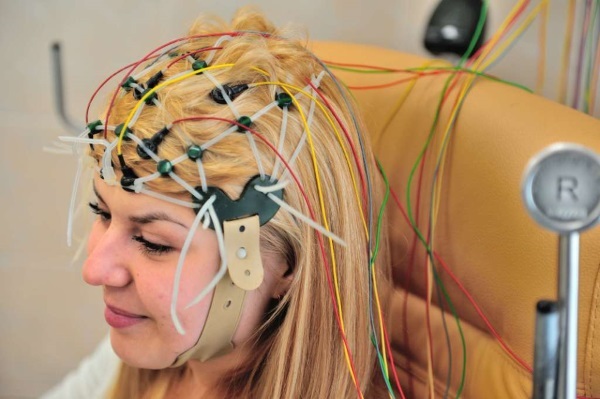
- Magnetic resonance therapy. Allows you to take pictures of the brain, assess the condition of tissues in the presence of injury or tumor. When using a contrast agent, you can trace the blood supply to the organ and identify areas of ischemia. The cost of the examination varies from 3,000 to 8,000 rubles.
- Angiography. The state and speed of blood flow in the cerebral arteries is assessed. The cost of the procedure is about 5000-6000 rubles.
Instrumental diagnostics can be performed in any hospital or private medical center that has modern equipment.
To assess the psychoemotional state, other research methods are used:
- Conversation. During the conversation, the psychotherapist determines the degree of impairment of consciousness, memory, identifies changes in behavior and speech. To assess memory, the doctor asks you to memorize pictures or words in the specified order. Consciousness and thinking are analyzed with the help of drawings or individual leading questions. During the conversation, the therapist monitors changes in the patient's mood and behavior.
- It is a multidimensional questionnaire. The doctor asks certain questions and, depending on the answers, determines the person's condition according to various scales, such as hysteria, hypochondria, depression, paranoia.
-
Rorschach test. The researcher asks the patient what is depicted on 10 cards, 5 of which are drawn in black ink, 2 in red-black and 3 in color. The technique allows you to assess a person's attitude to various situations.
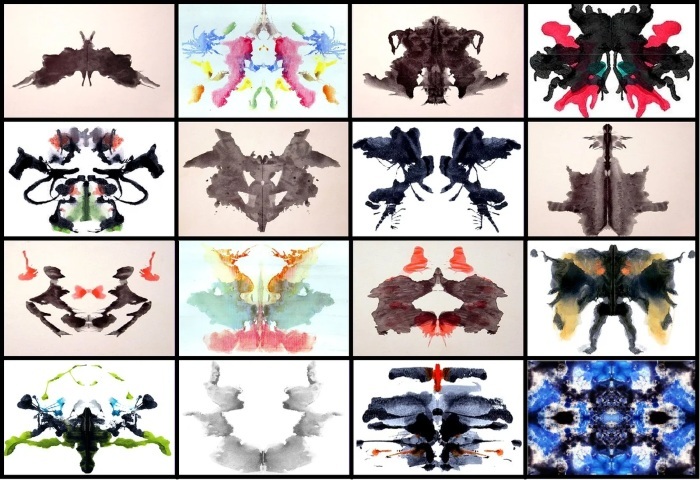
- Thematic apperception test. Internal conflicts and interests are investigated. There are 31 tables with different images. The patient is given 20 tables, for each of which he must compose a plot story.
A session with a psychotherapist starts at 1,800 rubles. The price for a comprehensive examination depends on the professionalism of the specialist and the number of tests performed.
To establish an accurate diagnosis, a long visit to a psychotherapist is required. Observation of a person lasts about 6 months, during which the doctor should note at least 3 symptoms of organic personality disorder.
When to see a doctor
If you suspect an organic disorder, you should contact a neurologist and psychotherapist as soon as possible.
It is imperative to carry out a comprehensive diagnosis of both the brain and the psychoemotional state. A neurologist can help establish the root cause of behavioral changes and deterioration in thinking. A conversation with a psychotherapist will improve the quality of life, stabilize mood swings, and prevent the development of depression and paranoia.
Often, patients with an organic disorder do not feel the presence of the disease, so they and their close relatives seek help late, when the pathology threatens the development of dementia. It is advisable to seek help from doctors in the early stages of the development of a psychoemotional disorder, regardless of from the species when a person has unreasonable mood swings, irritability or inadequate behavior.
Prophylaxis
Organic personality disorder is a disorder associated with a malfunction of the brain. Therefore, the main measure for the prevention of psychoemotional disorders will be the timely treatment of injuries, infectious pathologies and cardiovascular disorders.
To avoid the development of pathology, it is recommended to adhere to the following rules:
- avoid stress;
- give up alcohol and drugs;

- do not abuse psychotropic drugs prescribed by the attending physician, take strictly according to the indicated dosage;
- in the presence of a hereditary predisposition, undergo a preventive examination by a neurologist, cardiologist, psychotherapist;
- adjust the diet;
- monitor blood glucose levels.
It is recommended to adhere to a positive attitude, rest on time, and observe hygiene.
Treatment methods
The goal of treatment is to eliminate the primary cause of the pathological process, to adapt a person to changes in personality that have occurred and in teaching him to control his emotional condition.
Against the background of severe organic disorders, it is important to remember that it is impossible to completely restore the injured parts of the brain. In this case, drug therapy and sessions with a psychotherapist can help stop the progression of dementia.
Before prescribing drugs and physiotherapy, the patient must get rid of the provoking factor: tumor, infectious disease, vascular disorder.
Medications
Complex drug therapy is selected depending on the type of organic disorder and the clinical picture of the disease.
It includes the following groups of drugs:
-
Antidepressants: Fluvoxamine, Amitriptyline. Corrects the emotional state: prevents the development of apathy, prolonged depression, improves mood.
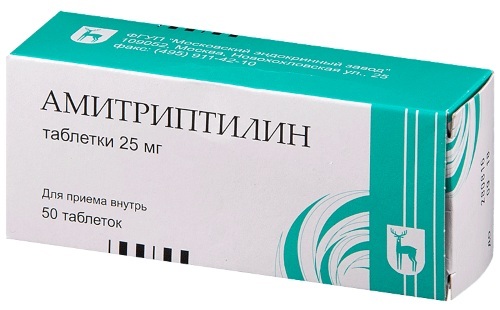
- Anxiolytic tranquilizers: Phenazepam, Diazepam. They have a calming effect and cause drowsiness.
- Antipsychotics: Triftazine, Aminazine, Tizercin. Reduces the level of aggression, paranoia, persecution mania.
- Nootropics and antihypoxants: Piracetam, Phezam, Cerebrolysin. They normalize the nutrition of neurons, prevent the development of hypoxia and cerebral ischemia. Thanks to this effect, the symptoms are relieved.
- Mood stabilizers: lithium preparations, carbamazepine. It is taken as part of supportive therapy. They prevent sudden mood swings and have a sedative effect.
- Anticonvulsants. Used in the setting of anxiety disorder to relieve cramps and muscle cramps in the abdomen and head.
The duration of drug therapy should not exceed 2 weeks. The daily dosage and type of drug are selected individually for each patient. The doctor's decision is influenced by the age, body weight, the presence of chronic pathologies of the patient and the severity of the symptoms of an organic disorder.
Traditional methods
Alternative medicine is ineffective in treating an organic disorder. They do not restore cognitive function, create socially acceptable behaviors, or relieve headache attacks.
From folk remedies to create a calming effect and relieve stress, it is allowed to drink chamomile tea. To prepare it, you need to brew 3-4 tbsp. l. dried flowers plants 500 ml boiling water. You can drink tea every day, but it is worth remembering that it has a low efficiency.
Other methods
In addition to drug treatment, the patient should take classes with a psychotherapist throughout the entire period of complex therapy.
Regular consultations have the following goals:
- improving the patient's quality of life;
- elimination of depression;
- teaching social norms and new patterns of behavior;
- getting rid of sexual disorders;
- obsessive-compulsive disorder therapy;
- creation of psycho-emotional comfort for the patient.
Psychological assistance is provided through regular conversations and a series of exercises.
These include:
-
Arttherapy. Patients paint or sculpt with clay. They learn to express themselves, accept criticism and improve themselves. In the course of therapy, irritability is removed, the person relaxes.

- Improving memory. Slows down the development of dementia. The doctor offers to remember the order of words, numbers or details in the specified image.
- Trainings. Essential for getting rid of paranoia, gaining self-confidence.
Treatment can be carried out both individually and in a group. The most effective is family therapy, where the patient learns to build correct relationships with relatives and receives emotional support from them.
Possible complications
In the absence of timely treatment of the root cause of the development of pathology and its acute symptoms may develop the following negative consequences:
- ischemia of the brain;
- hypoxia;
- as a result of prolonged depression, suicidal tendencies may appear;
- dementia;
- decreased cognitive function;
- social maladjustment;
- development of persecution mania, paranoia, phobias of various etiologies.
With a congenital form of pathology, the child has mental retardation, inappropriate behavior.
An organic disorder develops against the background of brain pathologies. The person loses control over their emotions and behavior. As the pathology progresses, his formed personality is erased.
The model of behavior changes: the patient shows aggression, irritability, suffers from frequent mood swings and migraine attacks. This disorder can develop into dementia and social maladjustment. Treatment combines drug therapy and sessions with a psychotherapist.
Author: Nika Zhuravleva
Organic personality disorder videos
Physician About Organic Personality Disorder:



